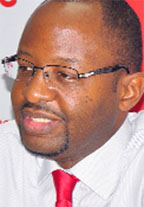Digicel’s Chief Executive Officer (CEO) Gregory Dean on Tuesday signalled his company’s eagerness to see the recent completion of draft legislation on the liberalisation of the country’s telecommunications sector followed by an acceleration of the process towards the end to the monopoly being held by the Guyana Telephone and Telegraph Company (GT&T). While conceding that Digicel, like GT&T, had some “concerns” with the new draft, Dean told assembled media representatives that he believed there should be no undue delay in the process since there were mechanisms that would address those concerns. “It’s long overdue,” he said.

In contrast to the position taken by GT&T’s CEO Yog Mahadeo that concerns arising out of the new draft legislation should be addressed as a precursor to the enactment of the new legislation which will effectively remove the mono-poly which it has held since 1991, Dean repeatedly underlined his company’s concern that there be no needless holdups to the creation of a regime which ushers in competition in the sector. “As far as liberalisation is concerned we would certainly not be putting the brakes on. We will be pressing the accelerator,” Dean told media representatives. He added that Digicel’s biggest concern was that there be “a level playing field.”
And in what appeared to be a direct response to a call made by Mahadeo for prior stakeholder consultation on the new draft legislation Dean told the media briefing that as far as he was aware such consultations were likely to form part of the process towards the eventual enactment of new legislation. “Stakeholders would have to be involved for the process to work,” he said.
While Dean has said that Digicel has placed no time frame on the emergence of a liberalized telecommunications sector, he made it clear that the retention of the monopoly continues to inhibit the ability of the company to bring more investment to Guyana. “There was always likely to come a time when a lack of return on investment would inhibit us,” Dean said. Up until now Digicel has invested some US$60 million in Guyana and Dean told the media briefing that the company’s efforts to consolidate its post-liberalization position were likely to see further investment in the telecommunications sector. According to Dean, the absence of a liberalized telecommunications sector has meant that, from Digicel’s perspective, “very significant investments have not been made”.
Both Digicel and GT&T have now publicly endorsed the liberalization of the sector though Dean told the media that the fact that the new legislation will be attended by regulations meant that there need be no holdups in pressing ahead with the legislation. Both companies received copies of the draft some weeks ago and while Mahadeo expressed the view that more time may have been necessary for a thorough examination of the document and the submission of comments Dean said Digicel was able to submit its comments and “concerns” in the allotted time. He pointed out that while there were “challenges” associated with the liberalization of the telecommunications sector there was nothing either new or revolutionary in the process and since this was the first phase of the exercise, there was sufficient time to address those challenges.
Meanwhile, Dean endorsed a comment made by the company’s Public Relations Officer Shonette Moore that the company had had “a good year in 2010”. He disclosed that the company’s cellular network expansion should see the provision of service to Ituni in a few days time and Matthews Ridge shortly thereafter. The company, he said, now boasts more than 250,000 cellular customers and is currently providing coverage for 95% of the country.








